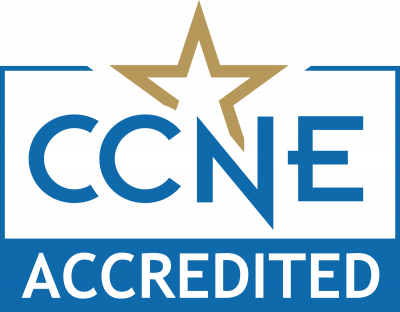
Your Path to RN Starts Here
Offered at the Storrs campus, the Bachelor of Science degree combines a liberal arts education with professional preparation in nursing. The curriculum typically requires four academic years of full-time study. Upon successful completion of the program, students receive a bachelor’s degree and are eligible for examination for licensure (NCLEX) as registered nurses.
Program Objectives
The objectives of the undergraduate program are the ability to:
1. Synthesize knowledge from the arts, sciences, humanities, and the discipline of nursing into the professional practice of nursing.
2. Demonstrate initiative, self-direction, and resilience generated by a spirit of inquiry and integrity that fosters professional role development and leadership through lifelong learning.
3. Formulate and articulate a philosophy of nursing that incorporates PRAXIS, caring, moral courage and all ways of knowing for practice as a global citizen in order to promote social justice and health equity for all.
4. Demonstrate professional comportment and related skills needed to practice safely, artfully, responsibly, and accountably within caring, sociopolitical, ethical, and professional parameters.
5. Apply the nursing process to co-create person-centered care that reflects individual preferences, values, needs, and contexts while addressing the determinants of health across health care settings.
6. Integrate knowledge, skills, and current research evidence in the implementation and evaluation of holistic person-centered compassionate care of individuals across the lifespan.
7. Lead intra-professional and inter-professional teams in response to emerging health care challenges with collaboration from clinical partners and community stakeholders for the provision of safe and quality health care access across the lifespan.
8. Understand and apply health informatics, communication skills, and evidence- based processes to compassionately address human, fiscal, and physical resource demands for the provision of high value health care with interprofessional partnerships and community stakeholders.
9. Advocate for patients, families, communities, and the nursing profession by participating in the development and implementation of health care processes and policies that promote health equity.
10. Design, organize, deliver, and continuously improve systems of health promotion and disease prevention to improve the care of individuals, families, and/or the community using innovative, data-informed, and cost-effective health care.
Curriculum
The first four semesters of the undergraduate program provide the building blocks of knowledge in the arts, humanities, and sciences. Students begin taking nursing courses their first year, but the majority of them are concentrated in the second half of the program. The nursing major includes courses providing the theoretical foundation of the discipline of nursing, research, and clinical application.
In the Clinical Simulation Learning Center, students learn and practice physical assessment skills, general management, and technical skills for patients across the lifespan, and interprofessional leadership skills.
In their last four semesters, students have small-group clinical experiences in a variety of settings, guided by expert nurse faculty. The Elisabeth DeLuca School of Nursing is affiliated with about 70 health care agencies within a 75-mile radius of the Storrs campus. These include hospitals, schools, day care centers, housing for the elderly, extended care facilities, community health agencies, ambulatory centers, and clinics. In addition to spending time with patients in the clinical setting, time is devoted to conferences with instructors and peers to discuss patient care experiences.
Admission Requirements:
The UConn Elisabeth DeLuca School of Nursing’s traditional undergraduate program only admits for the fall semester. Transfer and Change of Major students must meet the same application requirements as undergraduates to be considered for admissions. Please note that letters of recommendation are not required and will not be reviewed.
Admission Requirements for First-Year Applicants
Admission is competitive and applicants should have credentials placing them in the upper range of their high school graduation class. Prospective first-year students must have completed high school or college coursework in both biology and chemistry for admission consideration.
First-year applicants are reviewed by UConn's Office of Undergraduate Admissions. For more information, please visit their website.
Admission Requirements for Transfer Applicants
- Students with less than one year of college are evaluated on the basis of high school and college work (high school GPA and class rank, quality of academic courses, and college performance to date).
- Transfer students must apply through UConn Admissions. When applying, please specify Nursing as your first choice major.
- 3.0 cumulative GPA (4.0 scale)
- In-progress or completed prerequisites; college biology and college chemistry.
- Hybrid or online lab sciences are not accepted.
- A motivational statement (350 words or less) describing why you want to be a Nurse and what qualities do you possess that will contribute to your success? The motivational statement is evaluated on content/information, structure, and grammar/mechanics/language.
- Students must earn a letter grade of “C” or better for course credit to transfer. UConn Admissions will make the final decision for which courses transfer.
- Application Deadline: Feb. 1
Admission Requirements for Internal Change of Major Students
- Unofficial transcripts from non-UConn collegiate work.
- A motivational statement (350 words or less) describing why you want to be a Nurse and what qualities do you possess that will contribute to your success? The motivational statement is evaluated on content/information, structure, and grammar/mechanics/language.
- Student Change of Major online form
- 3.0 cumulative GPA (4.0 scale)
- Hybrid or online lab sciences are not accepted
- In- progress or completed prerequisites; college Biology (BIOL 1107) and college Chemistry (CHEM 1122, CHEM 1124 & 1125 or CHEM 1127)
- Application Deadline: Feb. 1
Health and Clinical Requirements
Other Academic Opportunities
Disclosure:
In accordance with the Higher Education Act, UConn hereby discloses that the curriculum for this program meets the State educational requirements for licensure as a Registered Nurse for the State of Connecticut. UConn has not determined whether the curriculum for this program meets the educational requirements for licensure as a Registered Nurse in any other states or territories and we encourage you to investigate the requirements in the states or territories that you may be interested in licensure prior to accepting our offer of admission.
